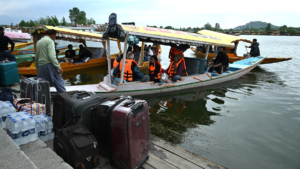There are places so beautiful, you’d think sorrow couldn’t touch them.
Pahalgam was one of them. A valley stitched together with rivers, pine forests, and meadows so green they seemed almost magical. Until just a few days ago.
March was supposed to bring spring. Wildflowers. New beginnings.
Instead, it brought gunfire. An attack so sudden, so cruel, it left the air heavier than the clouds that roll over these hills. Tourists who had come looking for postcard moments found themselves caught in a nightmare.
The shots weren’t just meant to hurt bodies — they were meant to shake hearts.
They were meant to create fear where once there was only wonder.
But if there’s one thing this valley knows, it’s how to survive storms.

Locals ran toward the chaos, not away. Drivers abandoned their taxis to shield tourists. Shopkeepers pulled down shutters — not out of fear, but to turn their shops into shelters. Families threw open their homes to strangers, offering water, food, and a place to breathe.
Doctors and volunteers worked through the night, refusing to give exhaustion even a glance. The streets, once echoing with horror, soon flickered with candlelight vigils — hundreds gathered, not just to mourn, but to promise: you are not alone.
Because terrorism can wound flesh, but it cannot erase humanity. It can bring darkness, but it cannot outshine hope.
Today, the rivers of Pahalgam still flow. The pine forests still whisper. And the people?
They rise — carrying grief in their hearts, yes — but also carrying a stubborn, burning refusal to be broken.
Because love, in places like this, always outlasts fear…